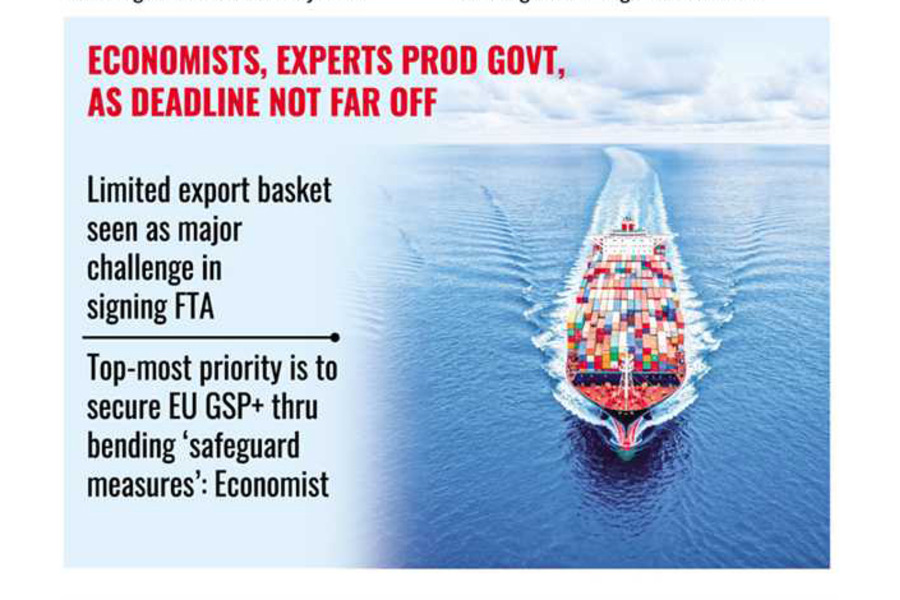
Published :
Updated :

Bangladesh should pick priorities of negotiation and countries or regions signing free-trade agreement (FTA) with which can reap maximum benefits after graduation when the country is destined to lose existing preferential market access.
Economists and experts suggest this priority action, also prodding the government for undertaking measures to raise awareness about intellectual property rights (IPR) and make effective policy engaging private sector in this regard to help draw private investment -- both local and foreign -- to help in export diversification and job generation.
The recommendations for the must-dos came at a roundtable on 'Intellectual Property and Trade Transition Challenges: Best Approaches for Local Industries of Bangladesh' organised by Bangladesh Chamber of Industry (BCI) at its office in Dhaka.
Anwar-Ul-Alam Chowdhury, president of BCI, presided over the meet where Sanya Reid Smith, senior consultant at Third World Network, made a presentation on FTA, bilateral, regional agreements, and the impact of IP.
Speakers note that signing FTA and its spinoff itself are ambiguous in nature as outcomes depend on negotiations and the benefits offered.
For free-trade deals, the country needs to reduce tariffs on imports, which cut government revenues. So, they have suggested developing specific strategy on such agreements for win-win trade transaction.
Speaking at the roundtable, Mostafa Abid Khan, component manager 1 (SSGP) at ERD and senior fellow at the Policy Research Institute of Bangladesh, termed limited export basket a "major challenge towards signing FTA as 60 per cent of the country's total export earnings come from 10 products."
"Instead of denying the challenges of FTA which takes three to four years of negotiation due to its tricky issues, it is imperative to identify the areas or issues that need to be addressed and take measures accordingly," he suggests.
Explaining the need for signing FTA, Dr MA Razzaque, chairman of Research and Policy Integration for Development (RAPID), said Bangladesh will lose market access to some countries and its priority should be to engage with negotiations with those counties or regions so that it can sustain the market benefits there.
Talking over GSP-plus benefits in the European Union (EU) after least-developed country (LDC) graduation, he said Bangladeshi-made readymade garments will not get duty benefit under the GSP-plus scheme due to its safeguard measures.
"So Bangladesh's top-most priority should be to get engaged with the EU right now to get the safeguard measures relaxed," he said, adding that the new EU GSP regimes, that also include the safeguard measures, will be effective from 2027.
And if the country does not start negotiations right now, it would be difficult to get the waiver when the new regimes come into effect.
Terming IP protection one of the most 'significant concerns' after graduation, he said until 2029, Bangladesh wouldn't be liable to provide IP protection for the medicines that are already available in markets, but problems might arise thereafter.
He, however, suggests raising competitiveness of local products, saying that protectionist system does not make industry competitive rather harm the consumers most.
Dr Fahmida Khatun, executive director of the Centre for Policy Dialogue, noted that free trade was the driving force behind global welfare, human development, GDP growth, and employment.
"But we now see a retreat from those gains. For many countries, dominance is determined not only by economic strength but also by geopolitical positioning. This shift will likely become even more decisive in the future, with purely economic benefits no longer the sole determining factor," she told the meet.
Countries like Bangladesh face significant challenges because of limited scientific and technological capacity and relatively small markets, she said, adding that some nations have already called for extending the pharmaceutical waiver to 2032 or 2033 to ensure access to affordable medicines.
Bangladesh, compared to other LDCs, has made good use of these flexibilities, though more could have been achieved.
She has suggested, among others, development-oriented approaches to building own intellectual capacity and fostering innovation.
"By focusing on trademarks and branding, we can reduce some compliance pressures while strengthening product marketability."
Dr M Masrur Reaz, chairman and CEO of Policy Exchange Bangladesh, said there are always tradeoffs in economic decisions and the tradeoff for countries is determined by the strategies to address those tradeoffs based on priorities.
For Bangladesh, it is important to sustain the economic base as well as prosperity to take advantage of global value chain at a time when the domestic economy is growing, he said.
To move for next level of economic-growth point and development, he said employment and global value -chain participation become critical for Bangladesh mainly to sustain its export-led growth with diversification and bringing more private investment.
"Despite tradeoffs, Bangladesh has no choice but to go for greater economic integration with the global community and bringing investment, including FDI."
Talking over IPR, he said Bangladesh has lots to gain from strengthening IPR both in terms of diversifying export and bringing foreign and local investments in emerging sectors like digital economy and for SMEs.
Munni_fe@yahoo.com


 For all latest news, follow The Financial Express Google News channel.
For all latest news, follow The Financial Express Google News channel.